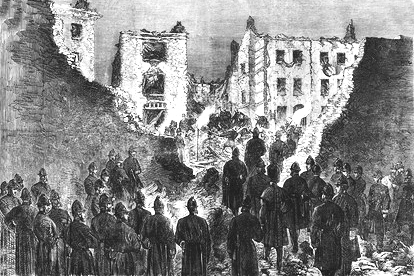uberpreneurs.com – The Victorian era, often romanticized as a period of industrial progress and cultural refinement, was also a time when the specter of terrorism loomed large, particularly through a series of bombing campaigns that shook the very heart of England. These acts of violence, perpetrated by various groups and individuals with diverse motives, were collectively known as the “Infernal Machine” due to the infernal devices used to sow fear and destruction. This article delves into the history of these bombing campaigns, their impact on Victorian society, and the measures taken to combat them.
The Fenian Dynamite Campaign
One of the most notorious bombing campaigns was carried out by the Fenians, Irish republicans who sought to end British rule in Ireland. The Fenian Dynamite Campaign, which began in the early 1880s, targeted symbols of British power and governance. Notable incidents included the bombing of the House of Commons in 1884 and several explosions in the Westminster area. The campaign was characterized by its use of sophisticated timing mechanisms and the psychological impact of the attacks, which struck fear into the heart of the British establishment.
The Anarchist Outrage
Another significant source of bombing campaigns during the Victorian era was the anarchist movement. Anarchists, who opposed all forms of government and authority, saw bombings as a means to bring about societal change. The most infamous anarchist attack occurred in 1894 when Martial Bourdin, a French anarchist, was killed while carrying a bomb intended for an unknown target in London. This incident, known as the Greenwich Bomb Outrage, was dramatized in Joseph Conrad’s novel “The Secret Agent.”
The Response of the British Government
The bombing campaigns of Victorian England prompted a robust response from the British government. Special police units, such as the Metropolitan Police’s Special Irish Branch (later known as the Special Branch), were established to combat terrorism. These units employed undercover agents, informants, and surveillance to infiltrate and disrupt terrorist networks. The government also introduced legislation, such as the Explosive Substances Act 1883, to make it easier to prosecute those involved in bombings.
The Impact on Society
The bombing campaigns of the Victorian era had a profound impact on British society. They led to increased security measures and surveillance, setting precedents for modern counter-terrorism strategies. The attacks also contributed to a growing sense of vulnerability among the British public, challenging the perception of the British Empire’s invincibility. Moreover, the bombings sparked debates about civil liberties, immigration, and the treatment of minority groups within the United Kingdom.
Conclusion
The bombing campaigns of Victorian England, collectively known as the “Infernal Machine,” represent a dark chapter in the history of terrorism. These attacks, carried out by Fenians, anarchists, and other groups, were a response to political grievances and sought to achieve their objectives through fear and destruction. The British government’s response to these threats laid the groundwork for modern counter-terrorism efforts. Despite the passage of time, the lessons learned from the Infernal Machine continue to resonate in the ongoing struggle against terrorism.
